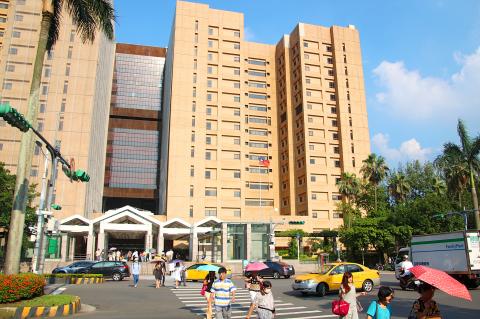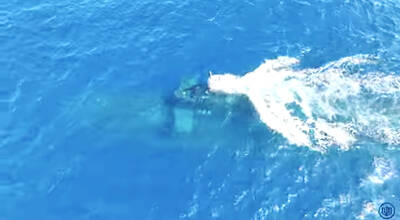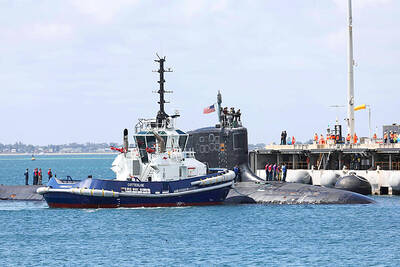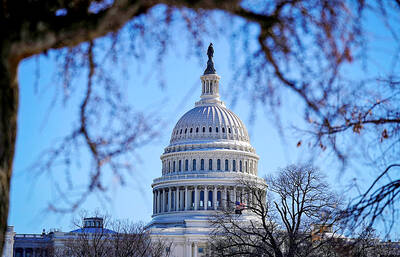National Taiwan University (NTU) Hospital attending physician Chen Kuen-feng (陳昆鋒) was found to have fabricated research data in 10 of his papers, the Chinese-language Apple Daily reported yesterday.
The fabricated data include previously published photographs that were reversed or cropped to appear different, as well as recycled phrases, the report said.
Five of the papers he cowrote with National Yang-Ming University (NYMU) professor Shiau Chung-wai (蕭崇瑋), who heads the university’s Institute of Biopharmaceutical Sciences, it said.

Photo: Chung Hung-liang, Taipei Times
The Ministry of Science and Technology has suspended Chen for 10 years, the most severe disciplinary measure after lifelong suspension, and ordered him to return research subsidies of NT$680,000 to the ministry, while Shiau has been suspended for five years and is to return NT$325,000 in research subsidies, the report said.
Shiau had met the requirements to be promoted to professor partly by submitting the fraudulent papers and could be demoted to associate professor, the report said.
Chen is also an adjunct associate professor at the NTU Graduate Institute of Molecular and Comparative Pathobiology, and has been an attending physician at the hospital’s Department of Medical Research since 2005.
He has received numerous awards for his research, including the 2012 Research Award of the Trans-Century Medical Research Foundation and the 2014 National Innovation Award.
Chen told the Apple Daily that he has a different view on the matter, but had to accept the ministry’s conclusion, as there is no way for him to appeal the case.
The newspaper quoted him as saying that he would correct the errors.
NTU president Kuan Chung-ming (管中閔), who was attending an event at National Chung Hsing University, said that academic misconduct is a complex issue and he had yet to read the full report on the case.
“Academic integrity is a basic requirement for any researcher. There is no question about that,” Kuan said.
The Ministry of Education has requested that NYMU reopen an investigation into the five papers that Shiau cowrote with Chen.
The university would follow the ministry’s instructions in the matter, NYMU said, adding that its academic integrity committee last year reviewed the papers, but did not find any academic misconduct on Shiau’s part.
Shiau has asked the university to return the research subsidies to the technology ministry, but would also seek administrative remedy, it added.
Minister of Science and Technology Chen Liang-gee (陳良基) told reporters that his ministry disciplined the academics last year, but did not release their names at the time.
The science ministry in April last year tightened its disciplinary measures for academic fraud and has since bolstered education on academic integrity, Chen Liang-gee said.
It would also consider amending regulations so that names of academics caught committing research fraud could be published, he added.
Chen Kuen-feng and Shiau were punished under an older version of the regulations that mandates lighter punishments, he said.
Under new regulations, universities whose academics are found guilty of research fraud would also be punished, he said, adding that since the new rules took effect, no academic fraud has yet been uncovered.
Additional reporting by Wu Po-hsuan and CNA

CSBC Corp, Taiwan (台灣國際造船) yesterday released the first video documenting the submerged sea trials of Taiwan’s indigenous defense submarine prototype, the Hai Kun (海鯤), or Narwhal, showing underwater navigation and the launch of countermeasures. The footage shows the vessel’s first dive, steering and control system tests, and the raising and lowering of the periscope and antenna masts. It offered a rare look at the progress in the submarine’s sea acceptance tests. The Hai Kun carried out its first shallow-water diving trial late last month and has since completed four submerged tests, CSBC said. The newly released video compiles images recorded from Jan. 29 to

DETERRENCE EFFORTS: Washington and partners hope demonstrations of force would convince Beijing that military action against Taiwan would carry high costs The US is considering using HMAS Stirling in Western Australia as a forward base to strengthen its naval posture in a potential conflict with China, particularly over Taiwan, the Wall Street Journal reported on Saturday. As part of its Indo-Pacific strategy, Washington plans to deploy up to four nuclear-powered submarines at Stirling starting in 2027, providing a base near potential hot spots such as Taiwan and the South China Sea. The move also aims to enhance military integration with Pacific allies under the Australia-UK-US trilateral security partnership, the report said. Currently, US submarines operate from Guam, but the island could

RESTRAINTS: Should China’s actions pose any threat to Taiwan’s security, economic or social systems, China would be excluded from major financial institutions, the bill says The US House of Representatives on Monday passed the PROTECT Taiwan Act, which states that Washington would exclude China from participating in major global financial organizations if its actions directly threaten Taiwan’s security. The bill, proposed by Republican Representative Frank Lucas, passed with 395 votes in favor and two against. It stipulates that if China’s actions pose any threat to Taiwan’s security, economic or social systems, the US would, “to the maximum extent practicable,” exclude Beijing from international financial institutions, including the G20, the Bank for International Settlements and the Financial Stability Board. The bill makes it clear that China must be prepared

Taiwanese trade negotiators told Washington that Taipei would not relocate 40 percent of its semiconductor production to the US, and that its most advanced technologies would remain in the nation, Vice Premier Cheng Li-chiun (鄭麗君) said on Sunday. “I told the US side very clearly — that’s impossible,” Cheng, who led the negotiation team, said in an interview that aired on Sunday night on Chinese Television System. Cheng was referring to remarks last month by US Secretary of Commerce Howard Lutnick, in which he said his goal was to bring 40 percent of Taiwan’s chip supply chain to the US Taiwan’s almost